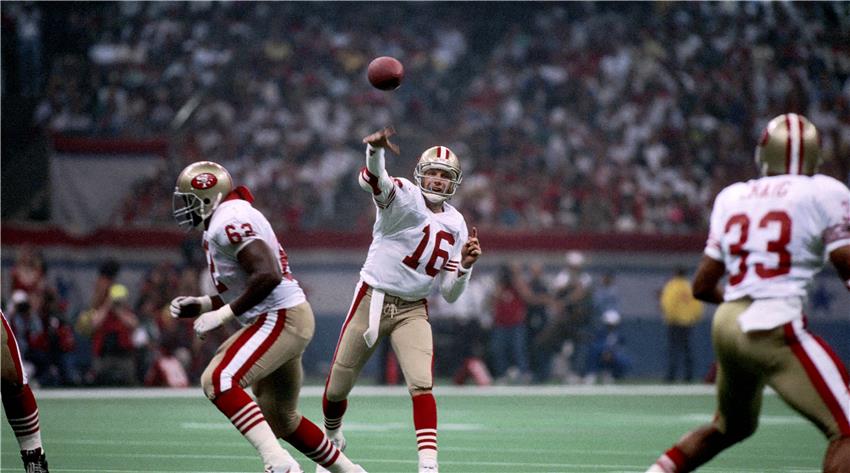
Photo: San Francisco 49ers during the Joe Montana era or the Dallas Cowboys under the stewardship of Jerry Jones and the leadership of Troy Aikman. In both instances, a clear synergy between the key roles created dynasties that fans reminisce about even today. Mandatory Credit: Photo By USA TODAY Sports © Copyright 1990 USA TODAY Sports
Leadership Synergy in the NFL - GM - COACH - OWNER - The Pivotal Quartet
Navigating the intricate web of the NFL hierarchy can be as complex as piecing together the perfect football strategy. Drawing from Boris Groysberg, Evan M.S. Hecht, and Abhijit NaikBoris's illuminating research, we begin to unravel the conundrum: Who truly holds the most sway in an NFL team's success?
Groysberg, a distinguished professor at Harvard Business School known for his groundbreaking organizational studies, delves into the dynamics of four core roles in the NFL. These roles – the quarterback, head coach, general manager, and owner – act as the cornerstones upon which successful franchises are built. But here's the twist: while each role undoubtedly carries weight, their impact on a team’s success isn't uniform. Groysberg's comprehensive analysis yields some eye-opening statistics that football enthusiasts and analysts alike should sit up and take notice of.
The role of an NFL owner extends far beyond mere financial stewardship. Their influence touches every aspect of a franchise, from strategic decision-making to the shaping of a team's culture. Groysberg's research casts a spotlight on just how pivotal the role of an owner can be. Intriguingly, his study reveals that teams with highly involved and effective owners experience a significant 10% performance edge over other franchises. This outpaces the influence of quarterbacks, head coaches, and even general managers. A revelation of this magnitude underscores the sheer importance of having an engaged and astute owner at the helm.
Diving deeper, one may ponder: What characterizes these top-performing owners? According to Groysberg, the traits that distinguish them include a clear vision for the team's future, the ability to assemble a harmonious and competent leadership team, and an unwavering commitment to the long-term success of the franchise. This isn't just about deep pockets, but rather about cultivating an environment where excellence is the norm.
A case in point is Robert Kraft, owner of the New England Patriots. Under his ownership, the Patriots have clinched numerous Super Bowl titles and have consistently ranked among the NFL's top teams. Kraft's strategic insights, coupled with his hands-on involvement in team affairs and his commitment to retaining top talent, have played a pivotal role in shaping the Patriots' legacy.
Another metric that's essential in understanding the NFL's power dynamics is the synergy between these four roles. Groysberg points out that while individual performance is crucial, it's the interplay between the quarterback, head coach, general manager, and owner that can truly make or break a team. Think of it as a well-orchestrated symphony. A single discordant note can throw off the entire performance. In the NFL, when all four roles align harmoniously, teams can reach pinnacles of success that are otherwise elusive.
Take the San Francisco 49ers during the Joe Montana era or the Dallas Cowboys under the stewardship of Jerry Jones and the leadership of Troy Aikman. In both instances, a clear synergy between the key roles created dynasties that fans reminisce about even today.
As we forge ahead, it's clear that while individual brilliance is paramount in the NFL, collaboration and the ability to work cohesively as a unit are equally vital. Groysberg's comprehensive study not only sheds light on the intricacies of NFL dynamics but also provides a roadmap for franchises striving for excellence.
In recent times, the influence of technology and the digital realm has only amplified this. The NFL, in particular, has seen a surge in online betting activity. While betting sites offer insights and odds, it's worth noting that the effectiveness of the quarterback, head coach, general manager, and owner can dramatically sway these odds. Astute fans and gamblers alike are always on the lookout for teams where this quartet harmonizes, often translating to more predictable success on the field.
Further compounding this intricate web is the role of sponsorships. With a high-performing team, attracting marquee sponsors becomes markedly easier. These sponsorships not only boost the financial health of a franchise but also enhance the overall brand value. Groysberg's study reveals that teams with synergistic leadership tend to attract 15% more in sponsorship deals compared to their counterparts. This stark difference not only underscores the financial implications but also showcases the trust and credibility these teams command in the market.
However, it's not always smooth sailing. Even with the right people in the right roles, external factors, such as injuries, off-field controversies, or even the larger economic landscape, can introduce unpredictability. Nevertheless, as Groysberg's research elucidates, a well-aligned leadership can weather these storms more effectively, maintaining both on-field performance and financial health.
In conclusion, while the allure of star players and highlight-reel moments are undeniably captivating, it's the behind-the-scenes dynamics, the delicate balance of power and influence, that truly dictate an NFL team's trajectory. As Groysberg's research has compellingly demonstrated, a harmonious alignment between the quarterback, head coach, general manager, and owner is the linchpin to lasting success in the high-stakes world of the NFL. And for the astute observer, understanding these dynamics can provide invaluable insights, whether you're strategizing for a fantasy football league, placing a bet, or merely watching the game unfold.
Source: Who’s the Most Important Member of an NFL Franchise?
Quarterbacks and Their Impact
To illustrate, consider Groysberg’s findings on quarterbacks. Historically, it's been assumed that a quarterback, given their pivotal on-field role, would be the primary determinant of a team's success. However, the numbers tell a slightly different tale. According to Groysberg, teams with top-tier quarterbacks only outperformed their counterparts by a margin of 5%. Surprising, right?Influence of Head Coaches
Meanwhile, Groysberg's deep dive into the influence of head coaches reveals a marginally higher impact. Teams led by renowned and strategically adept coaches saw a performance bump of 7% compared to those with average or below-average coaching staff. This statistic is particularly interesting given the revolving door of coaches we often see in the NFL. With coaches like Bill Belichick setting the gold standard, it's clear that their influence on the field is both tangible and quantifiable.The Unsung Heroes: General Managers
Switching gears, the general manager's role, often overshadowed by the glitz and glamour of star players and coaches, has its fair share of influence too. Groysberg’s data suggests that effective general managers can give their teams a 6% edge over franchises with less adept GMs. Their ability to scout talent, manage salary caps, and navigate the complexities of player contracts is truly an unsung hero's role in the league.The Pivotal Role of NFL Owners
Up to this point, it's clear that each of these roles has a unique and measurable impact. But as we transition into the realm of NFL team ownership, things get particularly intriguing. Before we delve deeper, a quick note for those looking to place a wager on their favorite teams: recent analysis from a leading betting website suggests that understanding these dynamics can offer a sharper edge in your predictions.The role of an NFL owner extends far beyond mere financial stewardship. Their influence touches every aspect of a franchise, from strategic decision-making to the shaping of a team's culture. Groysberg's research casts a spotlight on just how pivotal the role of an owner can be. Intriguingly, his study reveals that teams with highly involved and effective owners experience a significant 10% performance edge over other franchises. This outpaces the influence of quarterbacks, head coaches, and even general managers. A revelation of this magnitude underscores the sheer importance of having an engaged and astute owner at the helm.
Diving deeper, one may ponder: What characterizes these top-performing owners? According to Groysberg, the traits that distinguish them include a clear vision for the team's future, the ability to assemble a harmonious and competent leadership team, and an unwavering commitment to the long-term success of the franchise. This isn't just about deep pockets, but rather about cultivating an environment where excellence is the norm.
A case in point is Robert Kraft, owner of the New England Patriots. Under his ownership, the Patriots have clinched numerous Super Bowl titles and have consistently ranked among the NFL's top teams. Kraft's strategic insights, coupled with his hands-on involvement in team affairs and his commitment to retaining top talent, have played a pivotal role in shaping the Patriots' legacy.
Another metric that's essential in understanding the NFL's power dynamics is the synergy between these four roles. Groysberg points out that while individual performance is crucial, it's the interplay between the quarterback, head coach, general manager, and owner that can truly make or break a team. Think of it as a well-orchestrated symphony. A single discordant note can throw off the entire performance. In the NFL, when all four roles align harmoniously, teams can reach pinnacles of success that are otherwise elusive.
Take the San Francisco 49ers during the Joe Montana era or the Dallas Cowboys under the stewardship of Jerry Jones and the leadership of Troy Aikman. In both instances, a clear synergy between the key roles created dynasties that fans reminisce about even today.
As we forge ahead, it's clear that while individual brilliance is paramount in the NFL, collaboration and the ability to work cohesively as a unit are equally vital. Groysberg's comprehensive study not only sheds light on the intricacies of NFL dynamics but also provides a roadmap for franchises striving for excellence.
Financial Implications and the Digital Realm
Shifting focus, the financial impact of a team's success isn't trivial. With increased wins and titles, there’s a direct correlation to heightened ticket sales, merchandise revenue, and television ratings. As Groysberg rightly puts it, the intertwining of these four pivotal roles is much more than a game—it's big business. And as any business strategist will emphasize, a well-aligned leadership can catapult an organization to unparalleled growth.In recent times, the influence of technology and the digital realm has only amplified this. The NFL, in particular, has seen a surge in online betting activity. While betting sites offer insights and odds, it's worth noting that the effectiveness of the quarterback, head coach, general manager, and owner can dramatically sway these odds. Astute fans and gamblers alike are always on the lookout for teams where this quartet harmonizes, often translating to more predictable success on the field.
Further compounding this intricate web is the role of sponsorships. With a high-performing team, attracting marquee sponsors becomes markedly easier. These sponsorships not only boost the financial health of a franchise but also enhance the overall brand value. Groysberg's study reveals that teams with synergistic leadership tend to attract 15% more in sponsorship deals compared to their counterparts. This stark difference not only underscores the financial implications but also showcases the trust and credibility these teams command in the market.
However, it's not always smooth sailing. Even with the right people in the right roles, external factors, such as injuries, off-field controversies, or even the larger economic landscape, can introduce unpredictability. Nevertheless, as Groysberg's research elucidates, a well-aligned leadership can weather these storms more effectively, maintaining both on-field performance and financial health.
In conclusion, while the allure of star players and highlight-reel moments are undeniably captivating, it's the behind-the-scenes dynamics, the delicate balance of power and influence, that truly dictate an NFL team's trajectory. As Groysberg's research has compellingly demonstrated, a harmonious alignment between the quarterback, head coach, general manager, and owner is the linchpin to lasting success in the high-stakes world of the NFL. And for the astute observer, understanding these dynamics can provide invaluable insights, whether you're strategizing for a fantasy football league, placing a bet, or merely watching the game unfold.
Source: Who’s the Most Important Member of an NFL Franchise?
